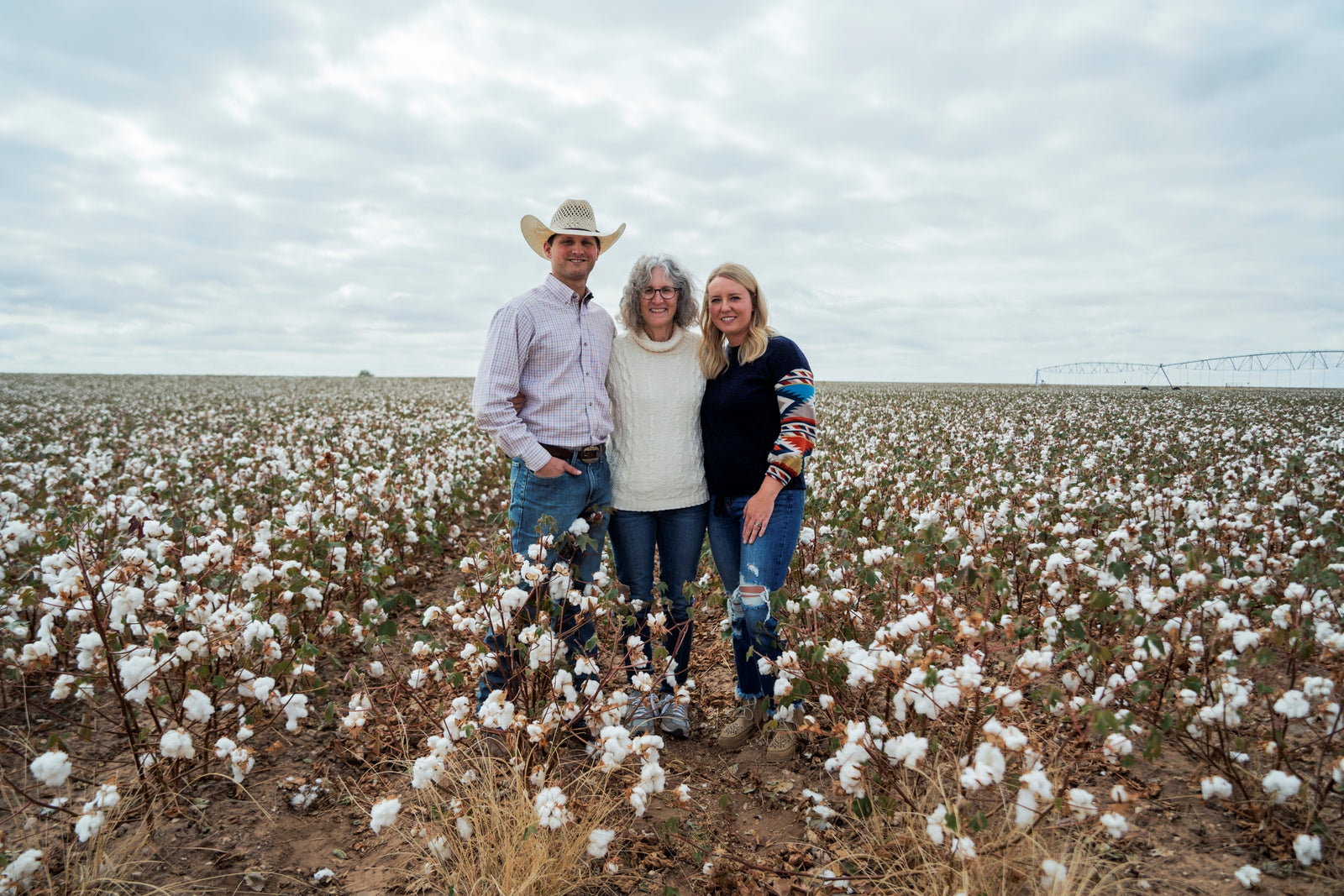Recently I was thrilled to be asked to feature American Blossom Linens on ABC World News Tonight with David Muir. The segment was part of their #MadeinAmerica series. The national passion is growing for USA made products. Today more Americans realize and care that our nation’s reliance on global supply chains has made us vulnerable to myriad forces beyond our control.
The ABC news team requested fresh footage of our manufacturing process, which begins with organic cotton grown in West Texas. So along with my husband Eric and a video crew, I traveled to Texas to meet with a few of the cotton farmers. Then we toured a cotton gin, also in Texas, where the seeds are separated from the fiber. Following the gin, the fiber is sent to spinners in North Carolina and weavers in South Carolina who turn it into cotton percale. Finally, the fabric goes to Thomaston Mills, our factory in Georgia, where associates cut and sew it into fine bed sheet, crib sheets and duvets, then pack and ship it directly to our customers. Learn more about our manufacturing process Made in the USA.
Our visit to West Texas was one of the highlights of my year. Traveling through Welch and Lamesa near Lubbock, all around me were croplands and wind farms that felt so peaceful amidst the lightly populated rural communities.
Approximately 4 million acres of cotton are grown in Northwest Texas. Only about 50,000 acres are grown organically. The cotton we use for our percale sheets comes from a desert plant that likes hot days and cool nights. Organic cotton thrives in the region because there are fewer insects to injure the plants and the limited rainfall enables mechanical weeding rather than use of herbicides. An early November freeze allows defoliation of the plants so the bolls can be harvested without the use of chemicals.
Touring the farms and meeting the growers, I was touched by their warm welcomes and impressed by the stories of families who have worked the land for generations. Kanyon Brown of Kanyon Brown Farms is a third-generation farmer whose 90-year-old grandfather still works on the farm. They put in long hours but still make time for fun and family activities. Kanyon, his wife Erika, and their three young children love to drive around the community to see how the cotton is growing and to check on their herd of cattle. Kanyon loves working the farm and admits, “What I do for fun is what I do.” Their interest in us was genuine as they graciously answered our many questions and walked us through acres of cotton where the strong, woody plants were blooming in the sun and waving in the breeze.
Expenses and weather are the farmers’ biggest challenges. Cotton crops need the right amount of rain at the right times and climate change affecting water supply is a concerning issue. Meanwhile, technology has become a bigger part of the business. It was interesting to learn that Kanyon can operate his irrigation system from his smartphone.
As they strive to produce better and more ethically grown crops, farmers are continually learning about plant and soil science, mechanics, and computer technology. Kanyon said that computers help run his tractor now and fully automated tractors may be available in the future.
While it’s tempting to romanticize the agricultural life I saw, mostly it takes hard work, know-how, and grit. The adults wear multiple hats so their small communities can thrive and help their neighbors when adversity strikes. Kanyon and Erika spoke of the community coming together to harvest the crop of an elderly neighbor who passed away and to provide supplies to a family who had lost their home in a fire. The community is strong and finds reasons to get together often. Having a small population of students, every school event is a community event including the homecoming dance.
Leaving West Texas after an all-to-brief visit, I felt newly energized to share my passion for healthful, organic cotton and Made in the USA products. Many of you share this passion. When you purchase American Blossom Linens you support good paying jobs here at home, America’s family farms and a more sustainable earth.
Kindly,
Janet Wischnia




